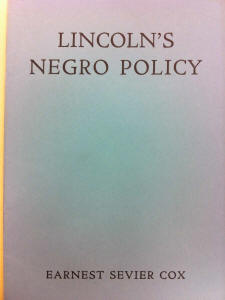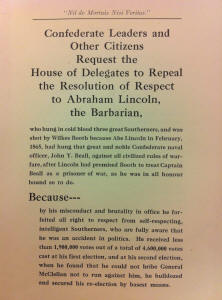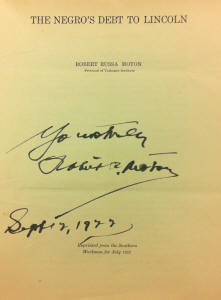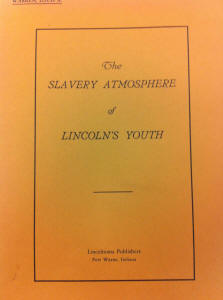|

|
Table
of Contents
Home
Slavery
& Race
The South
Visual
Representations
Memorials
& Appropriations
Slavery
& Race
Sarah
Henderson
Joe Levell
Dan Haller
Nick
Schradle
The South
Dean DeChiaro
Steve Schaffer
Rick Ramirez
Visual
Representations
Alana Lemon
Jon Ingram
Peter Fúster
Aaron Stanton
Memorials
& Appropriation
Charles
Bennett
Molly Storer
Emma
Thorne-Christy
Other Online
Exhibits
|
Slavery & Race
Introduction
In the wake of the Civil
War, the ideology of
reconciliation stressed the
similarities between the North
and South while ignoring the
underlying issues that caused
the conflict. The following
documents were all written in
the twentieth Century, and
qualify as retrospective
evaluations of slavery and race
as they pertain to President
Lincoln. [more]
These documents offer a
diverse collection of
perspectives on the status of
African Americans during and
after the Civil War. Although
Lincoln’s true feelings
regarding the issue of slavery
controversial, there is clear
evidence of an evolution in
Lincoln’s views of slavery and
race over time. Each of the
authors emphasize different
stages in the evolution of
Lincoln’s views in order to
frame their own particular
arguments about the role of race
in American society. Due to this
variance, all of these documents
pose at least partially — and
sometimes completely —
conflicting accounts of
Lincoln’s attitude toward
African Americans.
Only one of the documents,
written by white supremacist
Earnest Cox, completely embodies
the ideal of reconciliation. Cox
does so by fixating on the
evidence of Lincoln's preference
for the colonization of African
Americans during the first years
of his presidency— a racist
sentiment that undermines the
legacy of emancipation and
bolsters the conciliatory idea
that the war was fought
primarily in order to uphold the
Union. The other documents
engage and contradict this
ideology. Another white
supremacist, Neo-Confederate
Giles B. Cook, argues that
Lincoln's motivation for
emancipation stems from his
aspirations for personal glory.
This sentiment undermines
Lincoln’s legacy but does not
truly embody the spirit of
reconciliation. The other
documents directly challenge
reconciliation by focusing on
the legacy of emancipation and
expressing Lincoln’s centrality
in its deliverance. In the
pamphlet “The Slavery Atmosphere
of Lincoln’s Youth,” Louis A.
Warren argues that the
anti-slavery social climate of
Kentucky, and Lincoln’s personal
encounters with slavery in
adolescence, engendered his
empathy for the plight of slaves
and culminated in the
Emancipation Proclamation.
Finally, African American
scholar Robert Moton’s pamphlet,
“The Negro's Debt to Lincoln,”
emphasizes Lincoln’s role as the
Great Emancipator of the
African-American people. While
American culture was tempted by
reconciliation in the decades
following Reconstruction, these
documents show that disparate
ideologies grounded in
egalitarianism and white
supremacy challenged this
dominant ideology.
|
|

Cox,
Earnest Sevier. Lincoln’s
Negro Policy.
Richmond, Va.: The
William Byrd Press. 1938.

-
Sarah
Henderson
Earnest Sevier
Cox was a committed white
supremacist who published
Lincoln’s Negro Policy
to portray the theme of
colonization. Cox examines
both Lincoln’s abolition
of slavery and
colonization efforts. This
pamphlet examines a period
of time, the late 1930s,
when the question of negro
repatriation was presented
to congress for the first
time since Lincoln’s
death. The idea of
repatriation sparked Cox’s
interest, and he begins by
explaining that in his
opinion Lincoln was
“classed as the
outstanding advocate of
the cause of Negro
colonization” (Cox, 6).
Cox writes that for every
solution Lincoln
considered for the slavery
problem, the idea always
fell back on colonization.
Cox depicts Lincoln in a
positive light, explaining
that he gathered Negros
together to emphasize the
peaceful and voluntary
separation of the races.
Additionally, Cox
discusses that Lincoln
offered Federal aid to any
African Americans that
would volunteer for
colonization.
When
discussing the treatment
of African Americans
after emancipation and
the idea of the lost
cause, Cox uses
similar techniques to
those described in David
Blight’s Race and
Reunion
[1] . Cox shares similar
opinions to Jefferson
Davis regarding the
treatment of African
Americans after the
emancipation
proclamation. Cox argues
that in both the North
and South there was an
unwillingness to give
the Negro a nation of
his own. Cox uses his
piece not only to show
his Southern views, but
to depict his idea of
truth in the North.
Although Cox is able to
use quotes from Lincoln
to show that at some
point Lincoln agreed
with colonization, there
is no solid evidence
that this was the case
after 1863.
[1] Blight,
David W.
Race and
Reunion.
Cambridge:
Harvard University
Press, 2001.
Click
on Image
for Larger View
Return to
Top
|
|
 Cook,
Giles B. et al. “Confederate
Leaders and Other Citizens
Request the House of
Delegates to Repeal the
Resolution of Respect to
Abraham Lincoln, the
Barbarian... ” Cook,
Giles B. et al. “Confederate
Leaders and Other Citizens
Request the House of
Delegates to Repeal the
Resolution of Respect to
Abraham Lincoln, the
Barbarian... ”
1928. Pg 6-8.

-
Joe Levell
The
Confederate and white
supremacist argument
regarding slavery offers an
opinion that is far from the
popular image of Lincoln the
gracious emancipator. Known
as ‘the lost cause
argument,’ Confederate
members deny the critical
nature of slavery to the war
and depict Lincoln as a war
mongerer rather than a
national hero. David Blight
explains the lost cause by
saying it “took root in a
Southern culture awash in an
admixture of physical
destruction, the
psychological trauma of
defeat, a Democratic Party
resisting Reconstruction,
racial violence and with
time, an abiding
sentimentalism” [1]. The
Confederate memory became a
defense of Southern war
aims, turning the South’s
identity from racist
slaveholders to oppressed
patriots.
This
pamphlet includes letters
to politicians and an
biography of Lincoln.
Written in the twentieth
century, it offers an
interpretation of the war
that has developed over
time rather than an
instinctive reaction.
G.W.B. Hale, author of “A
Concise Life of Abraham
Lincoln and the Memorial
Act of Lincoln Passed by
the House of Delegates of
Virginia,” suggests that
“while pretentiously
claiming that slavery and
the Union were the main
factors that impelled the
war on the States, the
real inwardness of the
instigators of that war
was to perpetuate the
Republican party”
(Cook, 6). Instead of
suggesting one of the main
factors of the war was
both slavery and the
preservation of the union,
Hale argues that it
was purely political. By
splitting the war’s moral
and political roots,
Lincoln comes across as a
ambitious and arrogant
President who put
Presidential glory before
the best interests of the
population. By heavily
focusing on Lincoln’s lack
of religion, Hale argues
that the consequential
lack of Christian morality
proves Lincoln could not
have been the true savior
of the slaves. “Lincoln
did not save the Union as
it was (as our forefathers
made it) but only the
Republican party. He
defeated the South and
trampled under foot the
Constitution of the United
States in doing so” (Cook,
8). Lincoln, by freeing
the slaves, only
maintained the power and
status of the Republican
and destroyed the balance
of power in the South.
Such an argument is key to
the Southern white
supremacist view and
denies the South’s loyalty
to slavery, a role that
caused the biggest split
within American society.
[1] Blight,
David W.
Race and
Reunion.
Cambridge:
Harvard University
Press, 2001.
Click
on Image
for Larger View
Return to Top
|
|

Moton,
Robert Russa
“The Negro’s Debt to
Lincoln”
1922
-
Dan Haller

On May 30th,
1922 the Lincoln Memorial
was officially dedicated
and opened to the public
in Washington, D.C. Robert
Russa Moton, then the
Principal of the Tuskegee
Institute, delivered one
of the addresses. Moton,
who succeeded Booker T.
Washington as the head of
Tuskegee after
Washington’s death in
1915, was the only
African-American invited
to speak at the event.
While other
speeches given during the
dedication ceremony
celebrated Abraham
Lincoln's preservation of
the Union, Moton chooses
to celebrate Lincoln in a
way that had been nearly
forgotten by the 1920’s:
Lincoln as the “Great
Emancipator.” It is
obvious that for Moton,
and for most
African-Americans,
Lincoln’s greatness
resided in the fact that
he “spoke the word that
gave freedom to a race,
and vindicated the honor
of a nation conceived in
liberty and dedicated to
the proposition that all
men are created equal”
(Moton, 5). Rather than
speculating on what
Lincoln thought about
slavery and race, Moton
emphasizes the fact that
at the bleakest moment in
the history of the nation
Lincoln chose to fight for
the “common humanity” of
all men. Moton casts
Lincoln into the role of a
messiah who gave his life
so that all the people in
the Union could enjoy
equal opportunity and
freedom. Thus all men,
Black as well as White,
owe a great debt to
Lincoln.
The ideas expressed by
Moton parallel much of our
readings that cast Lincoln
as the “Great Emancipator”
and the Martyr who gave
his life to save the
nation. In Sarah Vowell’s
Assassination
Vacation,
we find a sentiment that
is very similar to the one
expressed by Moton.
Vowell’s empasized that,
whether or not Lincoln
originally planned to end
slavery from the start,
that is precisely what he
did [1]. For Vowell
as well as Moton,
Emancipation itself is the
legacy for which Lincoln
should be most celebrated.
It was his ability
to feel empathy to those
bonded in servitude, and
the fact that Lincoln
ultimately died for what
he believed in, that
continues to cement his
place in American History.
[1]
Vowell, Sarah. Assassination
Vacation. Simon and
Schuster, 2005. Pg 36.
Click
on Image
for Larger View
Return to Top
|
|

Warren, Louis A.
The Slavery Atmosphere of
Lincoln's Youth
Fort Wayne:
Lincolniana Publishers.
1933. Pg
4-9.

- Nick
Schradle
In 1933, on
the 70th anniversary of
the signing of the
Emancipation Proclamation,
the director of the
Lincoln National Life
Foundation Louis A. Warren
penned the pamphlet “The
Slavery Atmosphere of
Lincoln's Youth.” This
small, fourteen page
document posits new
historical evidence about
Lincoln's early life and
questions part of Lincoln
historiography.
Specifically, Warren
defends Lincoln's legacy
from critics who, he
perceives, doubt the moral
intentions behind the
release of the
Emancipation Proclamation.
Warren's pamphlet offers a
broad array of
circumstantial evidence,
as well as pure
speculation, that frames
Lincoln's experiences in
childhood and adolescence
as integral to his
presumed early moral
opposition to slavery, and
ultimately his issuance of
the Emancipation
Proclamation. In his book
Race and Reunion,
David W. Blight
argues that the Lost Cause
discourse, an occlusion in
the South's collective
memory about the origins
of and justifications for
the Civil War, undermined
the significance of
emancipation. This
discourse sought to deny
the legacy of
emancipation—which for
many, provided the
ultimate justification for
the Union war effort—by
recasting slavery as a
benevolent institution for
its African American
subjects. [1] Warren's
purpose is to defend the
legacy of the Emancipation
Proclamation by
constructing an argument
implicitly supporting
Lincoln's personal reasons
for issuing the
declaration.
Louis Warren's argument is
presented chronologically
over a broad temporal
scope. The first argument
in this chronology details
the existence of strong
anti-slavery elements in
the slave state of
Kentucky, extending back
to the childhood of
Lincoln's parents. Warren
offers circumstantial
evidence, collected from
the records of several
anti-slavery Baptist
congregations, that Thomas
and Nancy Lincoln may have
imparted anti-slavery
views, originating from
their own childhoods, on
the young future president
(Warren, 4).
Warren's second argument
focuses on the controversy
of slavery during
Lincoln's childhood in
Hardin County, Kentucky.
He notes that young
Abraham and his family
attended Little Mount
Church, a congregation
headed by the avowedly
anti-slavery Baptist
preacher, David Elkins
(Warren, 8).
To bolster his
argument, Warren includes
several letters written by
President Lincoln in
correspondence with
colleagues and friends, in
which the President makes
general reflections about
his early aversion to
slavery. Engaging in a bit
of historiography, he
admonishes (in)famous
Lincoln biographer William
Herndon for downplaying
these circumstances in
shaping Lincoln's moral
opposition to slavery
(Warren, 8).
Warren posits that
Lincoln's first, and
presumably negative,
encounter with slavery as
an adolescent probably
occurred along Cumberland
Road—a main thoroughfare
for the slave trade
between Louisville,
Kentucky with Nashville,
Tennessee (Warren, 9).
Finally, Warren identifies
the Lincoln family's move
to Indiana, and young
Abraham Lincoln's
subsequent experience with
slavery while taking a
river boat to New Orleans,
as another key factor
concretizing his early
anti-slavery beliefs.
This
document should be viewed
in light of the
increasingly pervasive
rhetoric in the decades
following Reconstruction
of the South's “Lost
Cause,” which sought to
exclude slavery and race
as factors contributing to
the Civil War. This
pamphlet is an attempt,
with the limited evidence
available to its author
Louis Warren, to
reemphasize the
significance of
emancipation by
legitimizing the budding
moral sentiments and early
emotional experiences of
the Emancipation
Proclamation's storied
author.
[1] Blight,
David W. Race and Reunion.
Cambridge:
Harvard University Press,
2001. Pg. 344-345.
Click
on Image
for Larger View
Return to Top
|
|
| |
About
this Project / Acknowledgements
Occidental
College's "Lincoln Legacies"
Research Seminar was developed by
Dr. Jeremiah B.C. Axelrod, Adjunct
Assistant Professor of History.
The library project
is developed in collaboration with
the Special Collections
Department:
Dale Ann Stieber, Special
Collections Librarian with student
staff
Alana Lemon and Brittany Todd.
Main graphic
images:
|
|
Page last edited on 03/12/2013.
Occidental
College Library Special
Collections & College Archives
© 2010 Occidental College
|
|
|
|
|
|